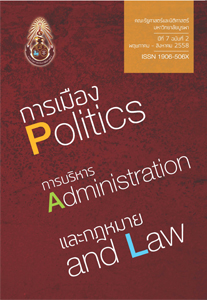ศึกษาเปรียบเทียบจุดแข็ง-จุดอ่อน ของนายกรัฐมนตรีจากระบบรัฐสภา และจากการเลือกตั้งโดยตรง
Keywords:
จุดแข็ง, จุดอ่อน, ระบบรัฐสภา, การเลือกตั้ง, Strengths, Weakness, Parliamentary system, Direct electionAbstract
บทความวิจัย มีคำถามการวิจัย คือ นายกรัฐมนตรีจากระบบรัฐสภาที่สมาชิกสภาผู้แทนราษฎรเป็นผู้เลือกนายกรัฐมนตรี และจากการเลือกตั้งโดยตรงของประชาชน มีจุดแข็ง-จุดอ่อนต่างกันอย่างไร การศึกษาดำเนินการโดยอาศัยข้อมูลจากเอกสาร และการสัมภาษณ์ผู้ให้ข้อมูลสำคัญ และวิเคราะห์ข้อมูลภายใต้ทฤษฎี
ผลการศึกษา พบว่า นายกรัฐมนตรีจากระบบรัฐสภา มีจุดแข็ง ทั้งสิ้น 3 ประการ คือ 1. ประชาชนเคยชิน และเห็นว่าสอดคล้องกับการมีพระมหากษัตริย์เป็นประมุข 2. ฝ่ายบริหารยุบสภาได้ และฝ่ายนิติบัญญัติอภิปรายไม่ไว้วางใจรัฐบาลได้ทำให้สามารถเปลี่ยนรัฐบาลได้ และ 3. ถ้าพรรคเดียวมีเสียงข้างมากจะทำให้รัฐบาลมีเสถียรภาพสูงและควบคุมสภาได้เด็ดขาด ส่วนจุดอ่อนมีทั้งสิ้น 5 ประการ คือ 1. ขาดการถ่วงดุลอำนาจ 2. การบริหารงานของฝ่ายบริหารขาดเสถียรภาพถ้าเป็นรัฐบาลผสม 3. พรรคการเมืองอยู่ในอำนาจของกลุ่มทุน 4. มีการทุจริตการเลือกตั้งและการคอร์รัปชั่นอย่างมาก และ 5. เกิดรัฐบาลหุ่นเชิด นายกรัฐมนตรีหุ่นเชิด และสภาหุ่นเชิดได้ง่าย
ส่วนนายกรัฐมนตรีจากการเลือกตั้งโดยตรง มีจุดแข็ง ทั้งสิ้น 5 ประการ คือ 1. รัฐบาลมีเสถียรภาพทางการเมืองมากขึ้น 2. ประชาชนสามารถแสดงเจตนารมณ์ได้โดยตรงว่าตนต้องการให้ใครเป็นนายกรัฐมนตรี 3. รัฐบาลมีเอกภาพ และมีเสถียรภาพนายกรัฐมนตรีสามารถแต่งตั้งรัฐมนตรีที่มีความสามารถเหมาะสมกับตำแหน่งมาร่วมรัฐบาล 4. ลดสิ่งจูงใจที่จะซื้อเสียงเพื่อให้มีสมาชิกสภาผู้แทนราษฎรมากพอที่จะสนับสนุนให้เป็นนายกรัฐมนตรี และ 5. เกิดการถ่วงดุลระหว่างฝ่ายบริหารและนิติบัญญัติ
ในขณะที่จุดอ่อนของการเลือกตั้งนายกรัฐมนตรีโดยตรง มี จำนวน 4 ประการ คือ 1. ประชาชนบางส่วนกังวลว่าเป็นระบบประธานาธิบดีจะกระทบต่อสถาบันพระมหากษัตริย์ 2. การเลือกตั้งทั้งประเทศถึงไม่ซื้อเสียงก็ต้องใช้เงินจำนวนมากจะทำให้คนรวยได้เปรียบ 3. ถ้ารัฐบาลมาจากพรรคที่มีเสียงข้างน้อยในสภาจะทำให้บริหารงานยาก เพราะไม่สามารถผ่านร่างกฎหมายได้ และ 4. เนื่องจากนายกรัฐมนตรีมาจากการเลือกตั้งโดยตรงการถอดถอนอาจทำได้ยาก
ทั้งนี้จากการศึกษาสรุปได้ว่า ควรนำระบบแบ่งแยกอำนาจเข้ามาประยุกต์ใช้ในระบบรัฐสภาด้วยการเลือกตั้งนายกรัฐมนตรี และคณะรัฐมนตรีโดยตรง เพื่อสร้างเสถียรภาพทางการเมืองของไทย ทั้งระบบการเมือง และเสถียรภาพของรัฐบาลให้มีความเข้มแข็งมากยิ่งขึ้น
Comparative study of Strengths and Weakness of Prime Minister from Parliamentary System and Direct Election
The main of research question is Prime Minister from Parliamentary System elected by Member of Parliament and Direct Election from people how different strengths and weakness?. The methods of study are both documentary and field research by interviewing key-informants and analyzed by theory.
The results show that prime minister from parliamentary system has three strengths: 1) citizens are familiar with a form of government which places the king as a head of the State; 2) the parliament can be dissolved by the government and parliament has a right to pass motions of no-confidence debate; 3) the stability of the government relies on the majority of the seats in the parliament which means that the government can take control over the parliament when it has an absolute majority of seats. This study found five weakness in this system: 1) imbalance of power; 2) a coalition government can occasionally lead to instability; 3) capital group may dominate the political party or parties; 4) political corruption (political machination) and 5) it is a chance to create “a puppet government, prime minister, or even a parliament.”
On the other hand, the study found five strengths in the direct election: 1) the government is more stable than a previous system (parliamentary system); 2) citizens can directly select their own prime minister; 3) the power of prime minister to dominate coalition parties can ensure the government stability and unity; 4) it is more difficult for a prime minister candidate to buy votes in order to win the election and 5) this system allows checks and balances between the government and the parliament. However, there were four weakness in the direct election: 1) citizens may have some concerns that the direct election is similar to the presidential system which may have an impact on the monarchy; 2) the elite still has an opportunity to win the election; 3) if the government has minority of seats in the parliament, it would lead to the difficulty in passing a law; 4) it may be difficult to be impeached a prime minister from direct election.
In conclusion, the study suggested that the parliamentary system should apply a direct election of prime minister and a cabinet along with a separation of power system in order to ensure the political and government stability.






